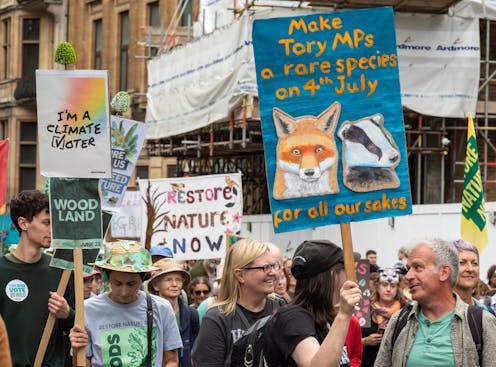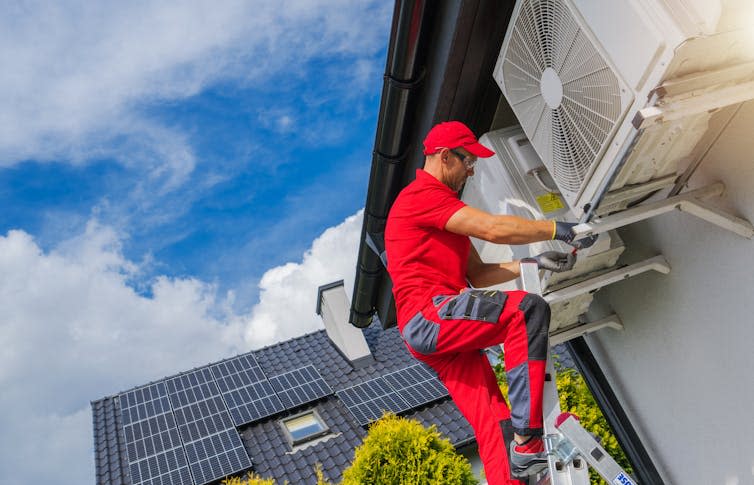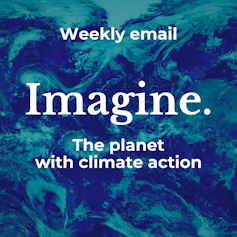Sunak’s anti-net zero gamble failed – signs suggest bold climate action can win elections

In a general election campaign light on policies, very little time was spent debating probably the biggest challenge of them all: the climate crisis.
Before the campaign began many had feared that Rishi Sunak’s climate reset speech in autumn 2023, the result of a deliberate campaign by a small but powerful anti-net-zero lobby within the Conservative party, would herald an era of political polarisation over climate change. But when it came to this election, climate was the dog that didn’t bark.
Read more: Rishi Sunak is introducing the polarised climate politics of the US, Canada and Australia to the UK
To an extent, this is good news. The Conservatives’ private polling must have confirmed what public opinion research has consistently told us: there are vanishingly few votes to be won through an agenda of delaying action on climate change.
Concern about the climate is high and rising, across all demographics and most political affiliations. Reform voters are the exception, with many opposing the country’s net zero target. The climate is simply not a major issue for this group, so it is unlikely to sway votes even for them. Given this situation, Tory strategists decided to downplay the climate rather than trying to fan the flames of division.
Neither, though, did Labour capitalise on it, preferring to stick to classic election issues like economic competence and NHS waiting lists. Although their plans for Great British Energy, a publicly owned energy company, were in the manifesto, they weren’t prominent in the campaign.
Even the Green party, which won a record four seats, made a point of campaigning on social issues like inequality rather than focusing on the climate. The Liberal Democrats, meanwhile, went big on water quality as their main environmental issue.
In short, we can say with confidence that most people did not want to vote for an anti-climate platform. But the election didn’t test the opposite theory: would voters have rewarded a bold pro-climate message placed centre stage, encompassing not just zero-carbon electricity, as Labour has promised by 2030, but the wider changes needed to transport, farming and land use, for example? Since this sort of debate on the net-zero transition wasn’t forthcoming during the campaign, the new government will be unsure of its mandate.
State co-ordination is necessary and popular
If the election didn’t tell us what we need to know, what can we learn from research on public attitudes to climate action? Along with academic colleagues, I have worked with representative groups of the public to debate how to meet climate goals.
There are three key lessons for politicians: understand that people want climate action; build trust in the government’s ability to lead the way; and involve people in the decisions that affect them.
On the first point, our research, backed by polling data, confirmed that people are deeply concerned about the climate. That’s why, as the Conservatives found to their cost, anti-climate rhetoric doesn’t win many votes.
Research suggests that people are willing to make changes to their lives, and support climate action taken by the government, businesses and others. Polling by Ipsos showed that 84% in the UK agree with the statement that “the way we live our lives will have to change substantially to address climate change”.
Just as clear as this finding, though, is the fact that the government must lead the way. People may be worried about climate change but this does not necessarily translate into support for specific measures, or enthusiasm for making changes to their behaviour.
Responses to surveys are conditioned by psychological, social and cultural factors, with social norms and expectations playing a crucial role in influencing a person’s beliefs and actions. And of course, the responses people give are conditioned by their economic situation and the infrastructure available to them.
Put simply, people may understand that driving a petrol car or using a gas boiler contributes to climate change, but find it difficult to shift to an alternative because they cannot afford to. Relying on people to change their own behaviour is a severely limited climate solution. People know that individual actions do not add up to enough, and that is why they look to their governments.

This means that people are likely to reward politicians who put forward bold policies which speak to people’s aspirations as well as their worries, and link emissions reductions with improvements in their quality of life.
Examples might include giving communities a stake in wind farms near them, as Labour quietly proposed in its energy plan. Or expanding public transport – the £2 cap on bus fares has been a runaway success. Or a frequent-flyer levy, which allows a family holiday but discourages excess air miles.
People also support the idea of renewing democracy by giving people a greater say in decisions that affect them, through local citizens’ juries or other opportunities for public involvement in policymaking.
This will require a leap of faith for the new Labour government, which campaigned cautiously and may remain nervous about bold climate pronouncements. But regaining people’s trust in government, as Keir Starmer promised to do in his first speech as prime minister, is half the battle.
Clear climate leadership and confident policy offers may have been absent in the 2024 election, but make a start now, and all the signs are that a bold strategy could not only put the UK back on track for its net zero target, it could contribute to a win at the ballot box next time round.

Don’t have time to read about climate change as much as you’d like?
Get a weekly roundup in your inbox instead. Every Wednesday, The Conversation’s environment editor writes Imagine, a short email that goes a little deeper into just one climate issue. Join the 30,000+ readers who’ve subscribed so far.
This article is republished from The Conversation under a Creative Commons license. Read the original article.
Rebecca Willis receives funding from UKRI (UK Research & Innovation).

 Yahoo News
Yahoo News 
